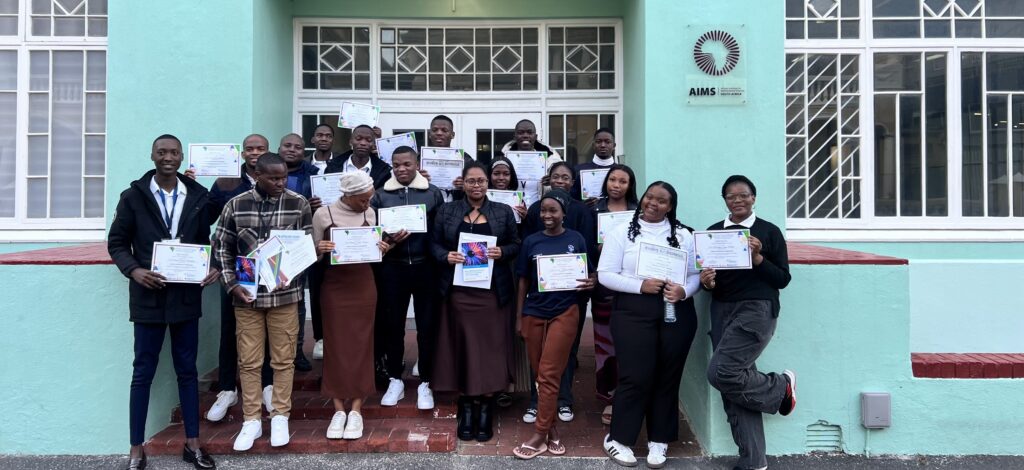Emerging scientists take part in Phase 2 of the Africa Scientifique capacity-building programme
From 2 to 4 June 2025, eleven Honours students from the University of Zululand (UNIZULU) Department of Mathematical Sciences took part in Phase 2 of the Africa Scientifique programme – a three-day capacity-building workshop alongside AIMS South Africa students. The Africa Scientifique (AS): Leadership, Knowledge, and Skills for Science Communication programme is held annually in three phases by AIMS House of Science in partnership with African Gong. The programme aims to enhance Afrocentric leadership and communication skills among emerging scientists.
Following the Phase 1 Introductory Workshops – held in February 2025 for AIMS students and in May 2025 for UNIZULU students -Phase 2 provided participants with a deeper understanding of the strategic, global, and contextual dimensions of science communication. The workshop offered an interactive and hands-on learning experience, providing students with practical tools to effectively communicate science, lead change, and engage meaningfully with African society.
It aimed to empower them to leverage these skills for leadership, career growth, and making an impact across academia, industry, and beyond, enhancing their employability.
The workshop commenced with inspiring remarks from senior leaders and experts, including Prof. Ulrich Paquet, Executive Director at AIMS South Africa; Prof. Karin-Therese Howell, Academic Director at AIMS South Africa; Prof. Tshilidzi Marwala, Rector at the United Nations University in Japan; Dr. Elizabeth Rasekoala, President of African Gong; and Dr. Rejoyce Gavhi-Molefe, Manager of AIMS South Africa House of Science.
Prof. Paquet highlighted the inseparable connection between leadership and communication, stating: “If you don’t understand what someone else understands or doesn’t understand, communication fails. And leadership is part of communication—just as communication is part of leadership.” He also issued a poignant warning about the increasing use of AI tools in science communication: “As you begin to communicate in a world shaped by AI and digital tools, I challenge you: never lose your own thoughts—never lose your own voice. Your voice matters. It matters more than the voice of technology, more than the voice of chatbots or algorithms. Your originality, your perspective—that is the voice of leadership. That is the voice that will shape our future. Not the voice of tech, but your own.”
In his keynote address, Prof. Tshilidzi Marwala, a distinguished African scientist and currently Rector of the United Nations University in Japan, discussed the role of African universities in building capacity for young researchers and academics to communicate their work effectively to the wider public in support of the Sustainable Development Goals.Reflecting on his own journey from a PhD in Artificial Intelligence at Cambridge to global academic leadership, he shared a personal story about learning engineering principles from his grandmother, who crafted clay pots using traditional knowledge. This narrative laid the foundation for a series of seven key principles for transformative science communication:
- Simplicity: Craft narratives that are accessible without resorting to excessive.
- Conceptual understanding: Gaining a comprehensive grasp of the underlying meanings behind methods and data.
- Mechanisms: Familiarise yourself with the interconnectedness of various elements of your research.
- Feedback: Engage actively with early input to improve your ideas.
- Contextualization: Ensure that your work is relevant and meaningful to your intended audience.
- Technology: Use it as a tool, not a replacement for critical thinking.
- Authenticity: Bring your authentic self and distinctive voice into your communication
Prof. Marwala highlighted the influential role of African scientists in shaping the continent’s future through strong and clear public engagement. “Africa’s future is being written by us. And you who are here must be the ones who write it—through how we tell our scientific stories to the world.”
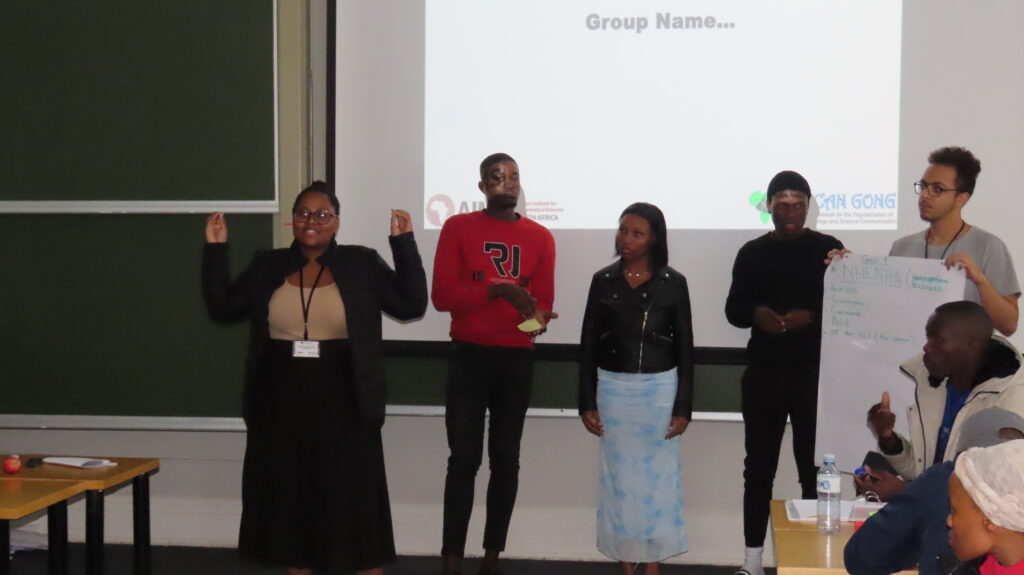
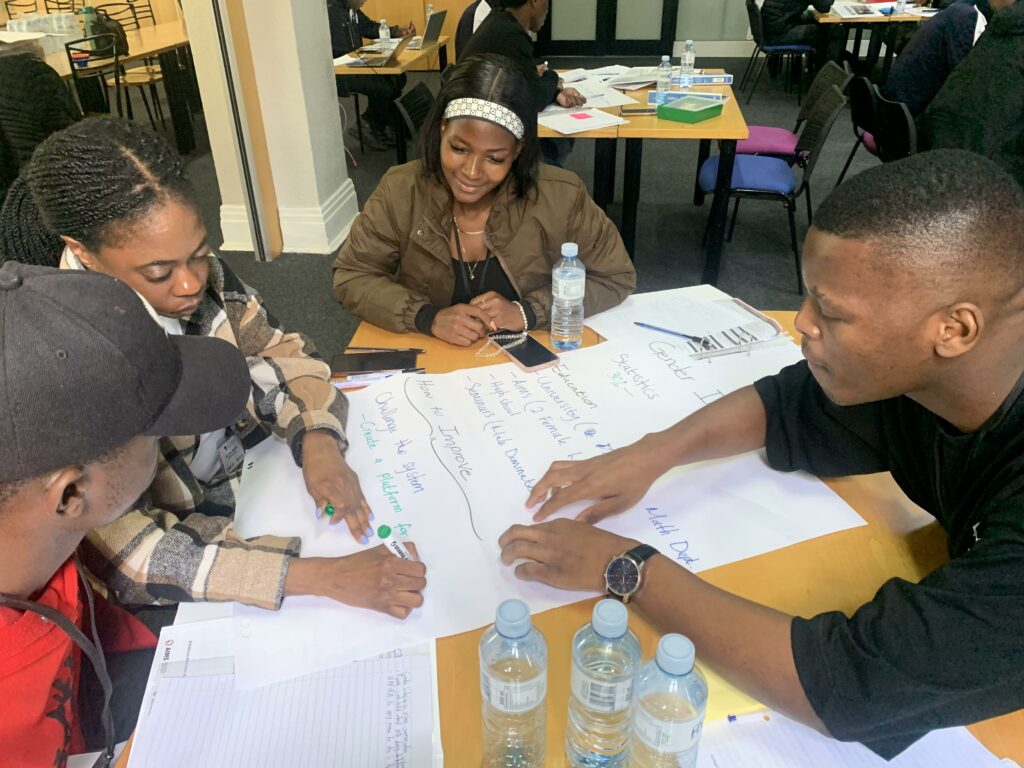
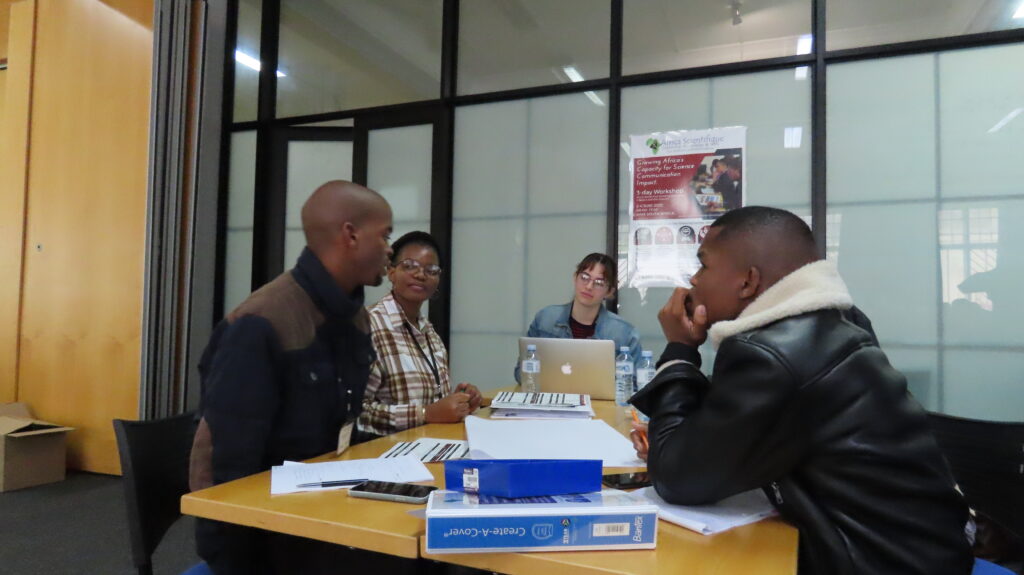
Over three days, participants engaged in hands-on, minds-on, informative, transformative, mindful, and highly interactive programmes and networking opportunities. The workshop was facilitated by the House of Science Manager, the African Gong President, and experts in science communication. Mathematical scientists and alumni from the AS Programme, who are currently pursuing careers in academia and industry, also contributed to the workshop during this period, acting as role models and mentors to foster a transformative, inclusive, and mentoring capacity-building experience.
The workshop featured rich, diverse sessions that presented globally inclusive yet Afrocentric discourses, narratives, and best practices aimed at transforming the participants’ understanding and strengthening their commitment to equity, ethics, and practical public engagement. Inherent in these good practices was solidarity with African publics, foregrounding African local and Indigenous languages for science communication and public engagement across the continent, with socio-cultural contexts including gender inclusion.
During the workshop, Africa Scientifique Programme alumni from 2023 and 2024 shared how the programme had transformed their lives, boosting their confidence, communication skills, career progression, and perspectives as emerging African scientists. These included Ms Marry Thekhwe, an MSc Student at AIMS South Africa and 2023 AS Alumni; Mr Benvollens Maluleke, an Automation Specialist at EXL Cape Town and Africa Scientifique Programme 2024 Alumni.
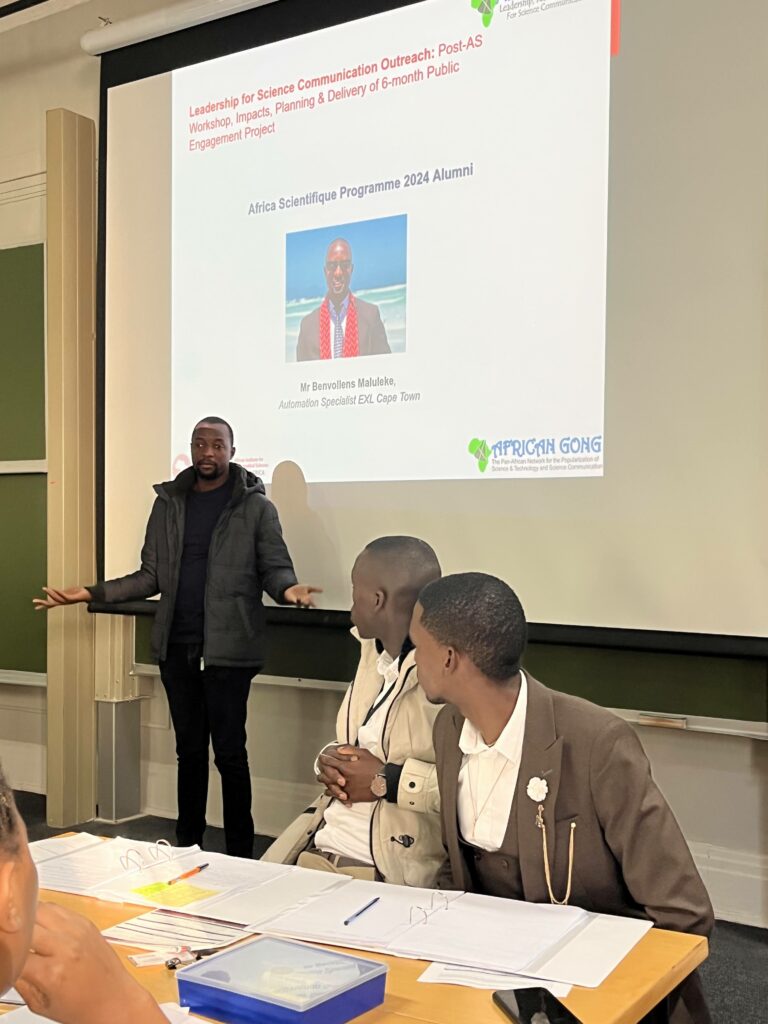
Mr Maluleke recounted his powerful post-workshop journey of translating knowledge into action. As a participant in last year’s Africa Scientifique three-phase programme, he completed the six-month mentorship and project implementation phase with a transformative outreach initiative aimed at improving safety for artisanal and skilled workers in his home community. Recognising the risks faced by informal labourers—often neglected in mainstream science communication—he developed and delivered targeted, accessible public engagement sessions using visual posters and short “elevator pitches” in local libraries, churches, and public gathering spaces.
Mathematical scientists and AIMS Alumni, Ms Ylaney Ramlall (Reinsurance Client Relationship Manager: Santam), Mr Phumlani Zondi (Lecturer, University of Zululand) and Dr Guy Blaise Dongmo (Probabilistic Safety Assessment Analyst: Eskom’s Koeberg Nuclear Power Station, South Africa), also contributed to the workshop.
During the panel discussion, they shared diverse lived experiences, insights, practical techniques, and strategies for advancing and leveraging science communication skills and opportunities to support career progression in academic and industrial fields.

Workshop Outcomes and Participants’ Testimonials
| “From Day 1 until the last day, our guest speakers and resident speakers delivered the content very clearly, and it was educational content. I learned a lot about who I am and what I should stand for. I see science communication promoting me as a good leader. I want to be a leader in the workplace, and I think knowing how to communicate can help me and collaborators be on the same page/understanding. I gained confidence, and I think I’m ready to present my research to people. Also, I know going forward I should do research that benefits people.” |
| “In order to have progress in the issue of gender inclusion, we should not be afraid to challenge policies that oppress marginalised groups. It is our responsibility to encourage women or girls to take STEM subjects.” |
| “The workshop was well-structured and engaging with relevant content and smooth organisation. It sparked strong interest in the Africa Scientifique Programme. The workshop has given me the mindset and tools to think beyond publishing papers. The workshop has significantly shifted my perspective on the research dissemination.” |
| “In order to have progress in the issue of gender inclusion, we should not be afraid to challenge policies that oppress marginalised groups. It is our responsibility to encourage women or girls to take STEM subjects.” |
| “The content was clear, informative and career-building, and the setting was exceptional as well as how the venue was organised. There has been an impact on my life from the AS programme, and I would love to recruit people to also be part of it. As an aspiring mathematician and scientist, it is important for me to know how to communicate scientifically and make sure the information that I’m sharing with the audience is clear, heard and understood. I came to the workshop being scared to communicate and engage with people but I am proud to say the fear has flourished and I’m now able to stand in front of people with confidence.” |
| “I learnt a lot about conceptualisation and the design of practical public engagement activities. I was driven far by the speech of Mr Benvollens Maluleke about the impact and delivery of the project activity. I finally knew how to present in front of many people. The collaboration with dynamic diversity has assisted me a lot” |
Mr Josiah Kimani, Ms Morongwa Ralefeta and Mr Gift Xelibokwe, all structured Master’s students at AIMS South Africa, led the workshop as part of their leadership training. Ms Noluthando Sithole assisted with logistics as part of her Internship training.
| The opportunity to be the program director during the June AS program was very affirming, while awakening. I felt “alive” again. I felt myself again. Thank you for this opportunity. Being part of the organising team gave me a deeper insight into what goes into running a day during AS. I now even more appreciate the work you do through the House of Science. Today, we had a session on preparation for our defence, and clearly, I was way ahead of my colleagues who didn’t attend the AS program. The AS program is worth all the effort and time. It’s my hope that I can execute my community engagement project.” Mr Josiah Kimanï |
What’s Next? The 6-month Post-Workshop Science Communication Project Activities, Mentoring & Delivery Phase
On the final day of the workshop, participants applied the new knowledge they learned from the Day 1 and Day 2 sessions through practical exercises. They conceptualised, designed, and presented individual practical science communication community project frameworks within three minutes, using a single PowerPoint slide. These projects will be implemented in Muizenberg and surrounding areas, as well as their hometown communities during the post-workshop mentoring phase (i.e., Phase 3, July – December 2025). The projects encourage sharing mathematical knowledge and address societal challenges in local contexts. The participants are expected to do so with special emphasis on Afrocentricity and adapting public engagement methods to those contexts to enhance learning experiences, accessibility, and impact.
They (participants) are already enthusiastic and prepared to embark on the third leg of their science communication journey, utilising their newly acquired knowledge and skills and sharing their short- and long-term communication goals.

